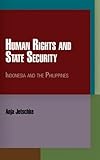Human Rights and State Security : Indonesia and the Philippines / Anja Jetschke.
Material type: TextSeries: Pennsylvania Studies in Human RightsPublisher: Philadelphia : University of Pennsylvania Press, [2011]Copyright date: ©2011Description: 1 online resource (368 p.)Content type:
TextSeries: Pennsylvania Studies in Human RightsPublisher: Philadelphia : University of Pennsylvania Press, [2011]Copyright date: ©2011Description: 1 online resource (368 p.)Content type: - 9780812243017
- 9780812204926
- Human rights advocacy -- Indonesia
- Human rights advocacy -- Philippines
- Human rights -- Indonesia
- Human rights -- Philippines
- International and municipal law -- Indonesia
- International and municipal law -- Philippines
- Human Rights
- POLITICAL SCIENCE / Human Rights
- Human Rights
- Law
- Political Science
- Public Policy
- 323.09598
- online - DeGruyter
- Issued also in print.
| Item type | Current library | Call number | URL | Status | Notes | Barcode | |
|---|---|---|---|---|---|---|---|
 eBook
eBook
|
Biblioteca "Angelicum" Pont. Univ. S.Tommaso d'Aquino Nuvola online | online - DeGruyter (Browse shelf(Opens below)) | Online access | Not for loan (Accesso limitato) | Accesso per gli utenti autorizzati / Access for authorized users | (dgr)9780812204926 |
Browsing Biblioteca "Angelicum" Pont. Univ. S.Tommaso d'Aquino shelves, Shelving location: Nuvola online Close shelf browser (Hides shelf browser)

|

|

|

|

|

|

|
||
| online - DeGruyter The First Prejudice : Religious Tolerance and Intolerance in Early America / | online - DeGruyter The Queen's Library : Image-Making at the Court of Anne of Brittany, 1477-1514 / | online - DeGruyter Dark Age Bodies : Gender and Monastic Practice in the Early Medieval West / | online - DeGruyter Human Rights and State Security : Indonesia and the Philippines / | online - DeGruyter What Caused the Financial Crisis / | online - DeGruyter Urban Tomographies / | online - DeGruyter Architecture and Landscape of the Pennsylvania Germans, 1720-1920 / |
Frontmatter -- Contents -- 1. Human Rights and State Security in International Relations -- 2. International Norms and Their Contestation in Human Rights Dialogues -- 3. Indonesia's New Order 1965-1978: Transnational Advocacy and State Security under Military-Led Modernization -- 4. The Philippine New Society 1972-1986: Transnational Advocacy and Human Rights Change -- 5. Indonesia's New Order 1986-1998: Transnational Advocacy and Human Rights Change -- 6. Subcontracted Violence in the Philippines 1986-1992: Excusing Violations -- 7. Excuses and Paramilitary Violence in East Timor and Indonesia 1999-2005 -- 8. The Philippines 1999-2008: Counter-Terrorism and Human Rights Violations -- 9. Contested Norms and Human Rights Change -- Notes -- Abbreviations -- References -- Index -- Acknowledgments
restricted access online access with authorization star
http://purl.org/coar/access_right/c_16ec
In recent years, influential studies have shown that the activities of human rights organizations are central in convincing violating governments to improve their practices. Yet some governments continue to get away with human rights violations despite mobilizations against them. In Human Rights and State Security: Indonesia and the Philippines, Anja Jetschke considers the impact of transnational human rights advocacy on the process of human rights reform and democratization in two countries that have been successful in resisting international human rights pressure.Jetschke details the effects of campaigns waged by international and domestic NGOs, foreign governments, local opposition leaders, and international organizations. She argues that the literature on transnational advocacy overlooks the ability of governments to justify and excuse human rights violations in their public dialogue with human rights organizations. Describing efforts of international and domestic human rights advocates to protect the rights of various groups, the case studies in this book suggest that governments successfully block or evade pressures if they invoke threats to state security. Jetschke finds that state security puts into play a set of powerful international norms related to sovereignty-a state's right to territorial integrity, the secular organization of the state, or a government's lack of control over the means of organized violence. If governments frame persuasive arguments around these norms, they can effectively mobilize competing domestic and international groups and trump human rights advocacy. Human Rights and State Security shows that the content and arguments on behalf of human rights matter and provide opportunities for both governments and civil society organizations to advance their agendas.
Issued also in print.
Mode of access: Internet via World Wide Web.
In English.
Description based on online resource; title from PDF title page (publisher's Web site, viewed 24. Apr 2022)


